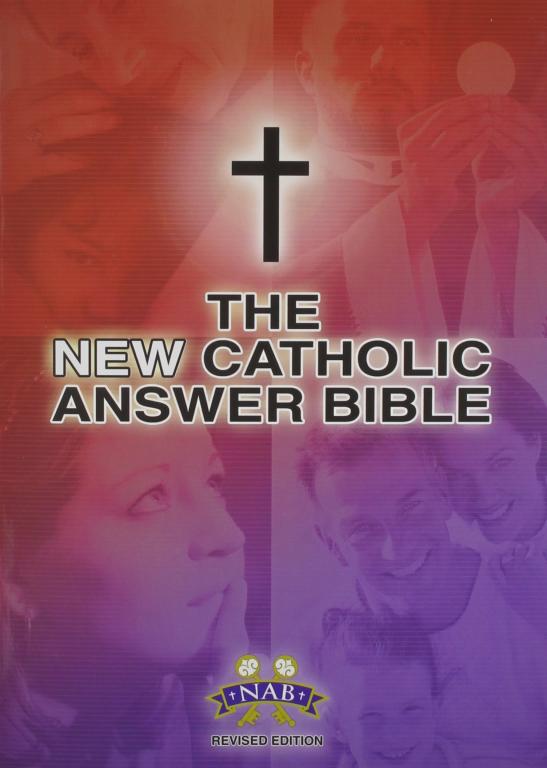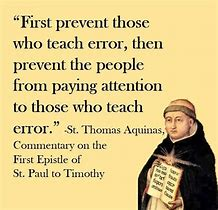So then, if Catholics lack an "official" interpretation, then why not include them in the group of denominations which comprise the group of "Churches that differ with each other?" My point is this, what significance can we actually assign to the fact that various interpretations exist? If individual Catholics are allowed to interpret the scriptures, then perhaps there are millions of different interpretations out there. And perhaps they existed all the way from the beginning of time?
...nor do Catholics have to interpret every verse of the Bible according to some dogmatic proclamation of the Church.
This is another ridiculous (and highly annoying) myth that we hear all the time. Indeed, the orthodox, faithful Catholic must interpret doctrines he derives from Scripture in accordance with the Church and tradition,
but so what?
Every Protestant does the same thing within their own denominational tradition. No five-point Calvinist can find a verse in the Bible which proves apostasy or falling away, or one that teaches God’s desire for universal, rather than limited atonement (and there are many such passages). He can’t deny total depravity in any text, or irresistible grace. We all have orthodox and dogmatic boundaries that we abide by. The Catholic exegete is bound by very little, and has virtually as much freedom of inquiry as the Protestant exegete. The online (1910)
Catholic Encyclopedia article on
“Biblical Exegesis” states:
(a) Defined Texts
The Catholic commentator is bound to adhere to the interpretation of texts which the Church has defined either expressly or implicitly. The number of these texts is small, so that the commentator can easily avoid any transgression of this principle
Scripture Passages Definitively Interpreted by the Church
Many people think the Church has an official “party line” about every sentence in the Bible. In fact, only a handful of passages have been definitively interpreted. The Church does interpret many passages in Scripture to guide her teaching. Other passages are used as the starting point and support of doctrine or moral teaching, but only these few have been “defined” in the strict sense of the word. Even in these few cases the Church is only defending traditional doctrine and morals.
Nor do Catholics have to interpret every verse of the Bible according to some dogmatic proclamation of the Church. This is another ridiculous (and highly annoying) myth that we hear all the time. Indeed, the orthodox, faithful Catholic must interpret doctrines he derives from Scripture in accordance with the Church and tradition, but
so what?
Every Protestant does the same thing within their own denominational tradition. No five-point Calvinist can find a verse in the Bible which proves apostasy or falling away, or one that teaches God’s desire for universal, rather than limited atonement (and there are many such passages). He can’t deny total depravity in any text, or irresistible grace. We all have orthodox and dogmatic boundaries that we abide by. The Catholic exegete is bound by very little, and has virtually as much freedom of inquiry as the Protestant exegete. The online (1910)
Catholic Encyclopedia article on
“Biblical Exegesis” states:
(a) Defined Texts
The Catholic commentator is bound to adhere to the interpretation of texts which the Church has defined either expressly or implicitly. The number of these texts is small, so that the commentator can easily avoid any transgression of this principle.
Catholics are allowed to translate from the Greek, according to the latest textual and archaeological knowledge, to use different translations, and to even cooperate in ecumenical translation projects, such as the RSV and NEB. We can do all the stuff that Protestant biblical exegetes do. And I am allowed to freely interpret almost any text on its own, provided I don’t go against a dogma of the Church (I couldn’t, e.g., say that John 1:1 does not teach the deity and Godhood of Jesus).
Scripture Passages Definitively Interpreted by the Church
Many people think the Church has an official “party line” about every sentence in the Bible. In fact, only a handful of passages have been definitively interpreted. The Church does interpret many passages in Scripture to guide her teaching. Other passages are used as the starting point and support of doctrine or moral teaching, but only these few have been “defined” in the strict sense of the word. Even in these few cases the Church is only defending traditional doctrine and morals.
It is important to realize that the parameters set by the definitions are all negative, that is, they point out what cannot be denied about the meaning of a passage but do not limit how much more the passage can be interpreted to say. In other words, the Church condemns denials of a specific interpretation of the text, without condemning meanings over and above but not contradictory to it.
All of the following passages were definitively interpreted by the Church at the Council of Trent, for each has to do with justification or the sacraments, issues that divided Catholics and Protestants.
1.
John 3:5 “Unless a man is born of water and Spirit, he cannot enter the Kingdom of God.”
The Church condemned the denial that the words of Jesus mean that real (natural) water must be used for a valid baptism. At the time, the Anabaptists contended that water baptism was unnecessary because the mention of water was merely a metaphor. Other symbolic meanings in addition to the literal sense of real water can be found in the text, perhaps, but none are acceptable that deny the need for real water at baptism.
2.
Luke 22:19 and
3.
I Corinthians 11:24— “Taking the bread, he gave thanks, broke it and gave it to them, saying ‘This is my body given for you: do this in remembrance of me.”
The Church condemned the interpretation of these passages that denied that Jesus, in commanding his apostles to “Do this in memory of me” after instituting the Eucharist, conferred priestly ordination on them and their successors enabling them to offer His body and blood. More could be understood by the command to do this in remembrance, but that much could not be denied or contradicted by other interpretations.
4.
John 20:22-23— “Receive the Holy Spirit. Whose sins you shall forgive, they are forgiven; whose sins you do not forgive, they are not forgiven,” and
5.
Matthew 18:18— “Whatever things you bind on earth shall be bound in heaven, and whatever you loose on earth shall be loosed in heaven.”
The Church condemned the denial that in these two passages Jesus conferred a power exclusively on the apostles authorizing them and their successors in the priestly office to forgive sins in God’s name, and condemned the proposal that everyone could forgive sins in this sense.
6.
Romans 5:12— “Therefore, just as sin entered the world through one man, and death through sin, and in this way death came to all men, because all sinned…”
The Church condemned the denial of original sin to which all mankind is subject and which baptism remits, citing this passage to be understood in that sense.
7.
James 6:14— “Is anyone of you sick? He should call the elders of the church to pray over him and anoint him with oil in the name of the Lord.”
Definitively interpreting these passages, the Church condemned the denial that the sacrament of the anointing of the sick was instituted by Christ and promulgated by the apostles against those who deemed it a human invention of the later Church.
In addition, the decree of Vatican I about Christ establishing Peter as head of the Church — which cites Mt 16:16 and John 1:42 — is a defined doctrine, even though the phrasing about the use and interpretation of the scripture cited is more implicit than explicit, by comparison with the above Scripture passages.
***
Catholics have freedom to exegete and interpret the Bible. We submit to the guidelines of orthodoxy, but so do Protestants in large part as well.

www.patheos.com







